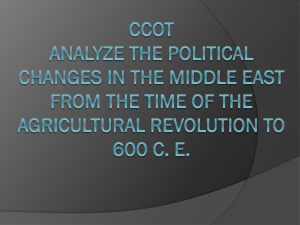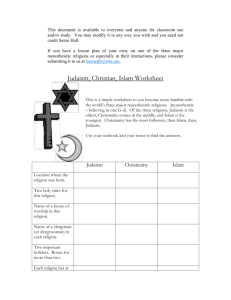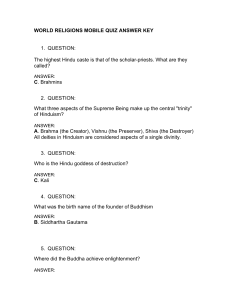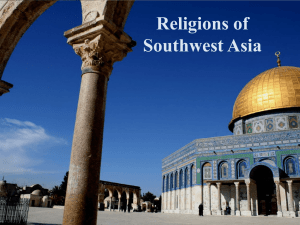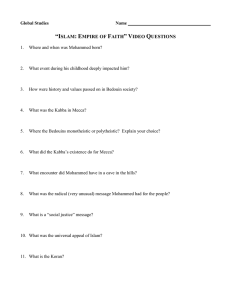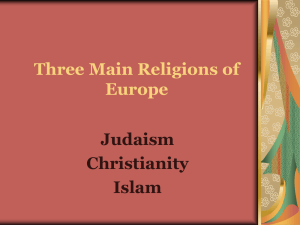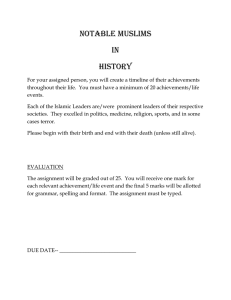Guidelines
advertisement
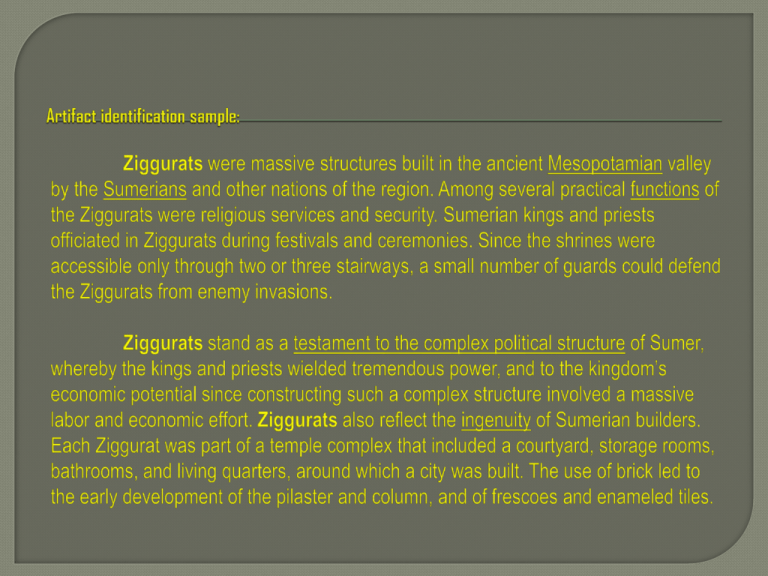
Question: Compare the basic principles of Judaism and Christianity. Why, in spite of its humble beginnings, did Christianity achieve the status of a world religion? Although early Christians were persecuted, specific socio-economic and political circumstances forced Roman Emperors to embrace the new creed as a crucial universal bond that helped them solidify their rule and hold together the multicultural and multiethnic Roman Empire. Judaism and Christianity are two related world religions. Judaism was founded by Abraham as a monotheistic religion – that is the belief in one, universal god. According to Judaist teachings, God and Abraham struck an agreement – the Covenant – according to which ancient Jews would believe and revere only one God. In exchange, God would love and protect Jews as the chosen people (I/34-35). The second important premise of Judaism is that God’s love to Jews is contingent upon their belief in him. If they stop following his guide, they will be punished. The oral traditions of Judaism were written down in the series of books called the Old Testament roughly between 500 and 300BC (II/143). Christianity took its roots from Judaism, and also is a monotheistic religion. Yet, despite their close relationship, Christianity and Judaism took a different path of development eventually became hostile to each other. The point of rupture between the two religions was teachings of Jesus Christ, who defied the Jewish traditional religious establishment, and whose appeal to the masses won him a significant popular backing (I/46-47). Identification essay provides information about an individual, a place, or a historical event on the basis of the following questions: • Who or What? • When? • Where? • What significant role did this individual/place/event play in history? Sample: Mohammed The founder of Islam, Mohammed (Mahomet) was born about 570AD in Mecca in what today is Saudi Arabia. When he was 40 years old, outside of Mecca he had visions of the angel Gabriel calling him to “recite” in the name of God the creator. He received revelations that were to become the first part of the Koran (Qua’ran) – the holy book of Islam. The Koran teaches faith in God, the coming judgment against unbelief, and the ideas of heaven and hell; it also describes duties appropriate to marriage, the family, and social life. Mohammed’s followers were called Muslims (Moslems) – “surrendered men,” since they had “surrendered” or submitted to one God (Allah). By 630AD, Mohammed had raised a powerful army and had captured Mecca. After the death of Mohammed in 632, his successors were able to conquer all of the Arabian Peninsula, the Middle East, and North Africa, and Spain establishing one of the greatest empires of the Middle Ages. Although the empire soon fell apart, Islam has continued its victorious rise in the Middle East and Asia and becoming the fastest growing religion in the world with about one billion followers. Introduction – 20% Does the introduction contain a clearly defined thesis stating an arguable point? Does the introduction provide 2-3 general points that will be offered as proof to be defended in the body of arguments? Body of arguments - 60% Do your arguments take the 2 -3 points mentioned in the introduction and analyze (rather than narrate) them, making good use of evidence drawn from the text book and lectures? Essay’s structure, grammar, style – 20% While the content of the essay form the basis of the grade, glaring spelling errors and convoluted sentence structure will have a negative impact on your grade. How do we define “civilization”? •It is an interaction of human beings in a creative way, when a critical mass of cultural and material resources has been built up •Human capacities are released not solely for immediate consumption •Political, economic, and cultural potential becomes in large measure self-sustaining Ziggurat – a sacred building or a temple in ancient Sumer. Built on a square or rectangular platform, a Ziggurat served for religious rituals and embodied the political power of the Kings and the priests. It also provided the last abode for the royal family, underscoring the significance of afterlife for the ancient Sumerians and asserting the prestige and the divinity of the King. How do we define “civilization”? •It is an interaction of human beings in a creative way, when a critical mass of cultural and material resources has been built up •Human capacities are released not solely for immediate consumption •Political, economic, and cultural potential becomes in large measure self-sustaining

